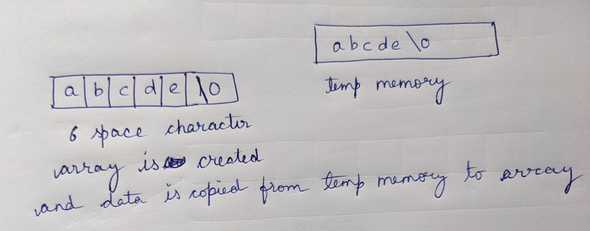« Characters arrays and character pointers
Understand Characters arrays and character pointers
Character arrays
1int arr[] = {1, 2, 3};2char ch[] = "abc";3cout << "arr: " << arr << endl;4cout << "ch: " << ch << endl;
cout is implemented differently for characters arrays and character pointers. It will go to the location and will start printing characters till it visits '\0' null character.
1cout << "&ch: " << &ch << endl;
This will actually give the address of the character array
Character Pointers
1char *c = &ch[0];2cout << "c: " << c << endl;
This will also print characters until it visits '\0' null character as c is a character pointer.
1char c1 = 'a';2char *pc = &c1;3cout << "c1: " << c1 << endl;4cout << "pc: " << pc << endl;
As a is not a string but a character so there won't be a \0 character at the end like a string. c1 is a char so it will just print a. pc being a character pointer will start printing garbage characters until it visits \0 null character.
1char str[] = "abcde"; // String literal
In case of string literals, first temp memory is created to store abcde. Then array is allocated memory and data is copied into it.
1char *pstr = "abcde";
Here pointer is pointing to read-only temp memory. It may or may not crash when we try to change it, which is worse. So we should not use this approach.
Final Code
1#include <iostream>2#include <iomanip>3#include <algorithm>4#include <string>5#include <cstring>6#include <vector>7#include <cmath>8#include <map>9#include <climits>10// climits for INT_MIN11#include <unordered_map>12using namespace std;13int main()14{15 int arr[] = {1, 2, 3};16 char ch[] = "abc"; // abc being a string last character is \0 null character1718 cout << "arr: " << arr << endl;19 cout << "ch: " << ch << endl;2021 cout << "&ch: " << &ch << endl;22 // This will actually give the location of character array2324 char *c = &ch[0];25 cout << "c: " << c << endl;2627 char c1 = 'a';28 char *pc = &c1;2930 cout << "c1: " << c1 << endl;31 cout << "pc: " << pc << endl;32 // This will start printing characters until it visits '\0' null character3334 char str[] = "abcde";35 // String literal3637 char *pstr = "abcde";38 // So We should not use this approach.39 return 0;40}
